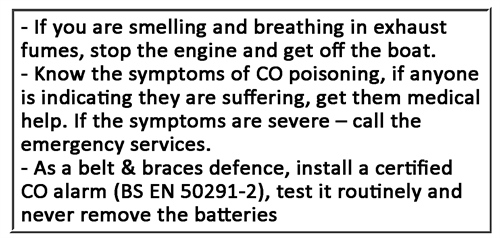NR16-005 Don't ignore exhaust smell - MAIB Bulletin Aug
Boaters need to pay attention to exhaust gases, particularly petrol engine exhaust fumes if they can smell them in the boat’s cabins because they can contain carbon monoxide (CO) in quantities that will harm or kill warns UK Parliamentarians and the Boat Safety Scheme (BSS).
The call follows the publication of the Marine Accident Investigation Branch safety bulletin concerning the recent deaths from CO poisoning of two people on their moored motor cruiser in Norfolk. Investigations found that exhaust fumes from running the engine could blow back in and fill their boat’s cabin space within three minutes.
Jonathan Shaw, Chief Executive of Policy Connect and the former Minister for Waterways, had this simple message:
‘If you can smell exhaust fumes in the cabin there is an issue that needs your attention. If those are petrol engine fumes act immediately.
‘At low concentrations over longer periods it can cause long-term health and memory problems. Higher amounts of CO can kill in just a few minutes.’
In June a man, woman and dog were found dead on their motor cruiser on Wroxham Broad which had its petrol engine running whilst on a remote mooring on the popular waterway. Previously, 16 boaters have died from the toxic gas in exhaust fumes in the past 20 years.
Graham Watts the BSS manager said:
‘CO is a colourless, odourless gas, hence the well-known silent killer tag, but you can smell the fumes from the exhaust, so that is why we promote the simple advice if there are exhaust fumes in the cabin, find out why, act to stop the problem and don’t put it off.
‘Safe boating is to understand and take control of all risks. This includes knowing about the CO risk and being able to recognise the symptoms of CO poisoning.’
The symptoms of poisoning are similar to flu or food poisoning as the toxin begins to take effect, these include headaches, nausea and dizziness.
As time passes and, or the amount of CO builds, you may suffer chest pains and breathlessness leading to seizure, unconscious. So the early recognition of the symptoms is critical, but if nothing is done, death can happen quickly.
Avoid problems by staying alert to engine fumes – keep them out of the cabin.
Run portable generators ashore away from the boat, never aboard.
Don’t run a propulsion engine when moored if the exhaust fumes are blowing back inside, even if your batteries are desperate for a charge. Wait until the wind changes for the better or move to a different mooring.
Be a good neighbour and don’t run petrol engines where exhaust fumes could enter a nearby boat cabin.
Graham Watts of the Boat Safety Scheme added:
‘Our records point to the fact that those new to boating may not be so aware of the CO risk as experienced boaters. If you know someone new to boating, why not have a chat about CO and point to the good safety advice on our BSS website.
‘Following the straightforward advice on the BSS website and having suitable working CO alarms on board as a back-up, will help you and your fellow boaters have a happy and incident-free time afloat.’
More information is available at www.boatsafetyscheme.org/co
- ENDS -
The Boat Safety Scheme, or BSS, is a public safety initiative owned by the Canal & River Trust and the Environment Agency. Its purpose is to help minimise the risk of boat fires, explosions, or pollution from boats harming visitors to the inland waterways, the waterways' workforce and any other people on or near the waterway.
Policy Connect is a non-profit organisation which runs numerous All-Party Parliamentary Groups, fora and commissions, bringing together parliamentarians, and representatives from the public, private and third sectors alike, to drive improvement in public policy in a range of areas. Secretariat services for both the All-Party Parliamentary Carbon Monoxide Group and Carbon Monoxide All Fuels Action Forum are provided by Policy Connect. Chief Executive Jonathan Shaw was the Labour Member of Parliament for Chatham and Aylesford from 1997-2010, and served as the Minister with responsibility for waterways at the Department for the Environment, Food & Rural Affairs (DEFRA) from 2007-8. www.policyconnect.org.uk
The Marine Accident Investigation Branch (MAIB), is a branch of the United Kingdom Department for Transport, which can investigate any vessel related accident occurring in UK waters and accidents involving UK registered ships worldwide. Investigations are strictly limited to establishing cause, promoting awareness of risks and preventing recurrence. The reports do not apportion blame and do not establish liability. The choice of which accidents are investigated is made on the basis of the scope of the safety lessons which may be learned as a result of the investigation. www.gov.uk/government/organisations/marine-accident-investigation-branch
